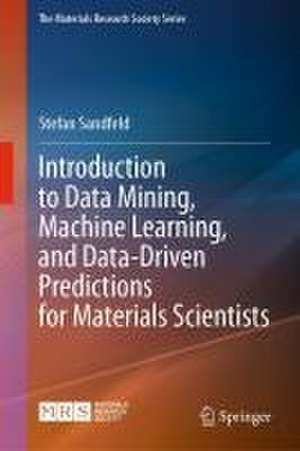Materials Data Science: Introduction to Data Mining, Machine Learning, and Data-Driven Predictions for Materials Science and Engineering: The Materials Research Society Series
Autor Stefan Sandfelden Limba Engleză Hardback – 9 mai 2024
This text covers all of the data science, machine learning, and deep learning topics relevant to materials science and engineering, accompanied by numerous examples and applications. Almost all methods and algorithms introduced are implemented “from scratch” using Python and NumPy.
The book starts with an introduction to statistics and probabilities, explaining important concepts such as random variables and probability distributions, Bayes’ theorem and correlations, sampling techniques, and exploratory data analysis, and puts them in the context of materials science and engineering. Therefore, it serves as a valuable primer for both undergraduate and graduate students, as well as a review for research scientists and practicing engineers.
The second part provides an in-depth introduction of (statistical) machine learning. It begins with outlining fundamental concepts and proceeds to explore a variety of supervised learning techniques for regression and classification, including advanced methods such as kernel regression and support vector machines. The section on unsupervised learning emphasizes principal component analysis, and also covers manifold learning (t-SNE and UMAP) and clustering techniques. Additionally, feature engineering, feature importance, and cross-validation are introduced.
The final part on neural networks and deep learning aims to promote an understanding of these methods and dispel misconceptions that they are a “black box”. The complexity gradually increases until fully connected networks can be implemented. Advanced techniques and network architectures, including GANs, are implemented “from scratch” using Python and NumPy, which facilitates a comprehensive understanding of all the details and enables the user to conduct their own experiments in Deep Learning.
The book starts with an introduction to statistics and probabilities, explaining important concepts such as random variables and probability distributions, Bayes’ theorem and correlations, sampling techniques, and exploratory data analysis, and puts them in the context of materials science and engineering. Therefore, it serves as a valuable primer for both undergraduate and graduate students, as well as a review for research scientists and practicing engineers.
The second part provides an in-depth introduction of (statistical) machine learning. It begins with outlining fundamental concepts and proceeds to explore a variety of supervised learning techniques for regression and classification, including advanced methods such as kernel regression and support vector machines. The section on unsupervised learning emphasizes principal component analysis, and also covers manifold learning (t-SNE and UMAP) and clustering techniques. Additionally, feature engineering, feature importance, and cross-validation are introduced.
The final part on neural networks and deep learning aims to promote an understanding of these methods and dispel misconceptions that they are a “black box”. The complexity gradually increases until fully connected networks can be implemented. Advanced techniques and network architectures, including GANs, are implemented “from scratch” using Python and NumPy, which facilitates a comprehensive understanding of all the details and enables the user to conduct their own experiments in Deep Learning.
Preț: 552.83 lei
Preț vechi: 682.50 lei
-19% Nou
Puncte Express: 829
Preț estimativ în valută:
105.87€ • 108.04$ • 89.07£
105.87€ • 108.04$ • 89.07£
Carte disponibilă
Livrare economică 01-07 februarie
Livrare express 21-25 ianuarie pentru 58.81 lei
Preluare comenzi: 021 569.72.76
Specificații
ISBN-13: 9783031465642
ISBN-10: 3031465644
Pagini: 618
Ilustrații: XXVI, 618 p. 200 illus. in color.
Dimensiuni: 155 x 235 x 37 mm
Greutate: 1.24 kg
Ediția:2024
Editura: Springer International Publishing
Colecția Springer
Seria The Materials Research Society Series
Locul publicării:Cham, Switzerland
ISBN-10: 3031465644
Pagini: 618
Ilustrații: XXVI, 618 p. 200 illus. in color.
Dimensiuni: 155 x 235 x 37 mm
Greutate: 1.24 kg
Ediția:2024
Editura: Springer International Publishing
Colecția Springer
Seria The Materials Research Society Series
Locul publicării:Cham, Switzerland
Cuprins
Introduction to Data, Data Mining, and Prediction in Materials Science.- A Primer on Probabilities, Distributions and Statistics.- Introduction to Statistical Machine Learning.- Artificial Neural Networks and Deep Learning.- Advanced Topics of Machine Learning and Data Mining in Materials Science and Engineering.- Conclusion Outlook.- Appendix.
Notă biografică
Prof. Dr. Stefan Sandfeld is Director of the Institute for Advanced Simulation: Materials Data Science and Informatics (IAS-9) Forschungszentrum Juelich, Germany; and Professor/Chair of Materials Data Science and Materials Informatics, RWTH Aachen University.
Textul de pe ultima copertă
This text covers all of the artificial intelligence, deep learning, and data science topics relevant to materials science and engineering, accompanied by numerous examples and applications. The book begins with a concise introduction to statistics and probabilities, explaining important concepts and definitions such as probability functions and distributions, sampling and data preparation, Bayes’ theorem, and statistical significance testing in the context of materials science. As such it is a useful introduction for both undergraduate and graduate students as well as a refresher for research scientists and practicing engineers. The second part is a detailed description of (statistical) machine learning and deep learning. It considers a range of supervised and unsupervised methods including multi-output regression, random forests, time series prediction, and clustering as well as a number of different deep learning networks such as convolutional neural networks, auto-encoder, or generative adversarial networks. The degree of detail and theory is such that all methods can be understood and critically discussed, and it is reinforced by extensive examples within materials science and engineering. The final part considers six complex applications and advanced topics of machine learning and data mining in materials science and engineering. A comprehensive appendix is included, summarizing the most important statistical and mathematical techniques.
- Introduces machine learning/deep learning methods in detail based on examples and data from materials science;
- Covers all theoretical foundations in an accessible manner, tailored to materials scientists and engineers;
- Maximizes intuitive understanding with materials science and physics examples, coding exercises, and online material.
Caracteristici
Introduces machine learning/deep learning methods in detail based on examples and data from materials science Covers all theoretical foundations in an accessible manner, tailored to materials scientists and engineers Maximizes intuitive understanding with materials science and physics examples, coding exercises, and online material




